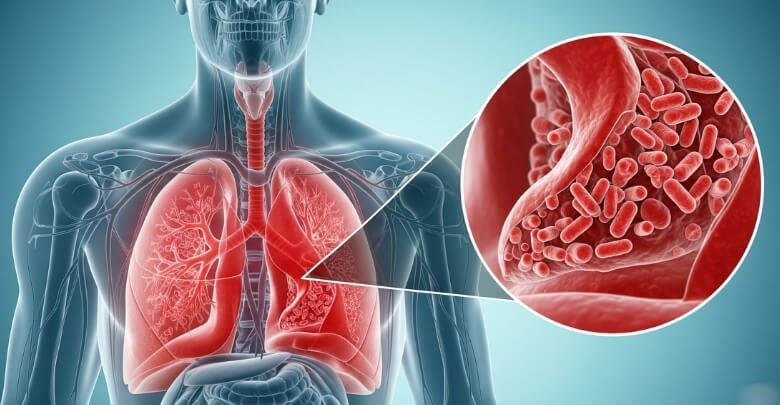Ever feel like your lungs need a fresh start? Whether you’re getting over a cold or just want to breathe easier, you might wonder how to keep your lungs in top shape. Many people turn to exercise, but can something as simple as running make a real difference? If you’re curious about how your lungs work and want to breathe better, you’re not alone.
So, does running clear your lungs?
Yes, running clears your lungs by making you breathe faster and deeper, which can move mucus out of your lungs. It also strengthens your breathing muscles and enhances overall lung function, especially after illness or if you have extra mucus.
Want to learn more? Keep reading to discover how running supports healthy lungs!
Does Running Clear Your Lungs?
Yes, running can help clear your lungs, but it works in more indirect and supportive ways. When you run, your body demands more oxygen, which forces you to breathe harder and deeper. This helps push mucus upward so it can be coughed out easily. Over time, this kind of movement also trains your lungs to work better and handle more air with less effort.

Faster Breathing Helps Remove Mucus
Running increases your breathing rate quickly, making you breathe deeply and faster than when sitting still. This change in rhythm moves air more forcefully through your airways. The strong airflow shakes loose mucus, making it easier for your body to clear it.
Each breath you take while running reaches deeper parts of the lungs and clears trapped mucus. This movement encourages better oxygen flow and a healthier airway environment. People recovering from colds or lung issues benefit from this regular deep breathing.
Movement Clears the Airways
Physical activity, especially running, helps mucus move from the lungs up toward the throat. Once it reaches the upper airway, you can easily cough it out. This natural clearing process reduces build-up and lowers the chance of infection.
For people who have lung issues, like chronic bronchitis, regular runs can be part of a care plan. Running helps make daily mucus clearance less tiring and more effective. It creates a steady rhythm that supports easier breathing over time.
Stronger Breathing Muscles
Running doesn’t just move your legs—it trains your breathing muscles to grow stronger as well. Your diaphragm and chest muscles work harder with each step and breath. This training helps your lungs expand more and take in more air.
With stronger muscles, your body can push air out quicker and bring fresh oxygen in smoothly. It makes breathing during rest and activity feel more natural. You’ll notice better control of your breath in everyday life.
Better Lung Function Over Time
The more you run, the more your lungs learn to handle work without struggling. They begin to use air better and deliver more oxygen to their blood. This leads to less shortness of breath and a stronger, cleaner lung system.
When lungs become more efficient, your body also becomes more energetic during movement. It’s easier to stay active and enjoy physical routines without losing breath. Even after sickness, regular jogging helps the lungs recover faster and cleaner.
What Running Does NOT Do?
- Does Not Remove Toxins Directly: Running does not directly “detox” your lungs of pollutants or toxins. The lungs are self-cleaning organs that use mucus and tiny hairs (cilia) to trap and remove unwanted particles, a process that continues regardless of exercise.
- Does Not Cure Lung Disease: While running can support lung health and help clear mucus, it does not cure underlying lung diseases or reverse severe lung damage.
Additional Methods (Besides Running) to Clear Your Lungs
Keeping your lungs clear helps you breathe better and feel more energized throughout the day. While running plays a big role, it’s not the only method you can use. Here are some practical and easy ways to support your lung health daily.

Controlled Breathing Exercises
- Deep belly breathing improves airflow and helps move stuck mucus from the lower parts of your lungs. Try lying flat and focusing on long, steady breaths through your nose and out your mouth.
- Pursed-lip breathing makes it easier to exhale stale air and keeps your airways from collapsing during breathing. Breathe in slowly through your nose, then push air out gently through pursed lips.
Stay Hydrated Throughout the Day
- Drinking warm fluids like herbal teas keeps mucus thin and easier for your body to move upward and clear. Aim for consistent sipping throughout the day, not just during meals.
- Water plays a key role in breaking down mucus, making it less sticky and easier to cough up smoothly. Try starting your morning with a glass of water before anything else.
Steam Inhalation
- Inhaling warm steam can help open airways and soften mucus trapped inside your chest or nasal passages. Place your head over a bowl of hot water and breathe gently for several minutes.
- Adding drops of eucalyptus oil supports deeper cleansing by reducing airway inflammation and loosening stubborn mucus buildup. Do this once or twice a day when feeling congested.
Postural Drainage Techniques
- Lying in certain positions helps gravity pull mucus from deeper parts of your lungs to the upper airways. Hold each position for a few minutes and breathe slowly while the mucus loosens.
- Combine this technique with chest tapping or gentle clapping to make the mucus release more effective and faster. Ask a trained person to help if you’re unsure about proper posture.
Chest Percussion Therapy
- Tapping firmly but gently on your back and sides helps shake mucus loose from your lungs’ inner linings. Do this therapy before or after breathing exercises for better results.
- A caregiver or respiratory therapist often performs percussion, but you can also use devices like OmniBreathe at home. These tools make it easier to maintain consistency and reduce mucus buildup.
Use a Mucus Clearance Device
- Devices like oscillating positive expiratory pressure (OPEP) tools help airways stay open and vibrate to dislodge mucus. Blow into the device steadily, and the vibrations help loosen sticky secretions.
- These tools are especially useful for people with asthma, COPD, or chronic chest infections that create daily mucus buildup. Using one regularly helps prevent mucus from becoming too thick.
Practice Physical Activity Beyond Running
- Walking briskly or dancing to music gets your heart pumping and encourages your lungs to stay active and clean. Short bursts of movement throughout your day help air circulate properly.
- Swimming is another great activity because the humid air around water keeps your airways moist and supports lung function. Even light swimming exercises can keep your lungs engaged and strong.
Air Quality Awareness and Home Environment
- Keep indoor air clean by using HEPA filters, avoiding strong chemicals, and opening windows when safe. Poor air can trigger mucus production and make your lungs work harder.
- Avoid exposure to secondhand smoke, dust, and mold, which can all increase inflammation and mucus levels inside your lungs. Clean air supports healing and keeps your breathing system clear.
Can Regular Running Truly Help Improve Your Lungs’ Health?
Absolutely yes, regular running can truly improve your lung health in several meaningful and lasting ways. It does more than just get you breathing harder—it actually helps build stronger lungs over time. Running trains your breathing system to work better, helping you breathe easier both during exercise and at rest.
Strengthens the Muscles That Help You Breathe
Each time you run, your lungs work harder and your breathing muscles get a solid workout. The diaphragm and rib muscles grow stronger with practice. Stronger muscles support deeper breathing and better air movement in and out. This makes daily breathing feel easier and more natural.
Expands Lung Capacity and Enhances Efficiency
Running helps your lungs take in more air and release waste gases like carbon dioxide faster. It also improves airflow through the airways and into the tiny air sacs. Over time, this increases the amount of oxygen your lungs can process. You start using oxygen more effectively with less effort.
Helps Oxygen Travel Better Through the Body
Running improves how your heart and lungs work together to move oxygen to your muscles. Your body learns to use each breath more efficiently. This leads to less breathlessness and better performance during physical tasks. Even at rest, your breathing can feel calmer and more controlled.
Lowers Inflammation and Strengthens Immune Defense
Exercise like running helps reduce swelling and keeps your lung tissues from getting irritated easily. It also supports your immune system and fights off infections. This is especially helpful for people who often deal with colds or breathing issues. Your lungs stay protected and healthier overall.
Supports Better Long-Term Respiratory Health
Lung function improves steadily with consistent running as airways become clearer and more responsive. You’ll notice fewer breathing troubles during everyday activities. Healthy lung tissue stays flexible and works more smoothly as you age. This makes running a great tool for long-term lung support.
What Can Cause Your Lungs to Go Bad?
Your lungs work hard every day, helping you breathe in fresh air and stay active. But just like any other part of your body, they can get damaged in different ways. Sometimes it happens quickly, but often it takes time to show. Understanding what can hurt your lungs is important if you want to keep them strong and healthy.

Smoking and Tobacco
Cigarette smoking is one of the biggest reasons why lungs go bad. It fills your lungs with harmful chemicals that slowly damage the tissue inside. Over time, this can lead to serious problems like lung cancer and a chronic cough. Even being around people who smoke can hurt your lungs too. The smoke in the air affects your breathing, even if you’re not the one smoking.
Dusty and Dirty Air
Breathing in dirty air for long hours can slowly harm your lungs. Things like smoke from cars, factories, or burning wood release tiny, harmful bits into the air. These tiny bits can settle in your lungs and make it harder to breathe. Working in places with too much dust, like mines or construction sites, can also make things worse. Over time, this can lead to lasting breathing problems.
Bad Air Inside Homes
Sometimes, the air inside your house can also hurt your lungs. If your house has mold, gas leaks, or poor airflow, your lungs may suffer. Breathing in strong cleaning sprays or chemicals from paints can irritate your chest. Even pet hair, dander, or bird droppings in the air can cause trouble. These things can trigger coughs, asthma, or make it hard to breathe deeply.
Infections in the Lungs
Getting a lung infection like pneumonia can cause pain and trouble while breathing. Infections can inflame your lung tissue and make you feel tired or weak. Some people get sick again and again, and that keeps damaging their lungs. If the lungs don’t fully heal after infections, breathing becomes harder. That’s why staying healthy and avoiding sick people helps protect your lungs.
Long-Term Lung Illness
Certain health problems, like asthma or COPD, stick around for life and affect how you breathe. These diseases make the airways tight or swollen, which blocks airflow and lowers oxygen levels. Even normal activities like walking fast can make breathing difficult. If not treated properly, these illnesses can slowly make the lungs worse. There are also breathing aid concerns when people depend too much on machines without medical advice.
Health Passed Down
Some people are born with weaker lungs or health issues they got from their family. These problems aren’t always easy to see at first. One example is a rare condition that makes the lungs break down faster over time. Doctors can test for these problems if someone has breathing trouble without a clear reason. Knowing early helps in treating them better and keeping the lungs safe.
Strong Medicines
Some medicines, especially those used to treat cancer or heart problems, can hurt the lungs. Even certain antibiotics can cause breathing problems if used for too long. Radiation treatment in the chest area can also leave scars in the lung tissue. Not everyone has side effects, but when it happens, it can make the lungs feel heavy or tight. Always talk to a doctor if you feel different after starting a new medicine.
Serious Health Problems
Conditions like fluid buildup, blood clots, or even lung cancer can damage how your lungs work. These problems often need quick care, or they can become life-threatening. Autoimmune illnesses like lupus or arthritis may also cause lung swelling. When lungs are inflamed or scarred, they can’t stretch or take in air properly. This can lead to daily tiredness or trouble breathing without much effort.
How Long Does It Take for Running to Make Breathing Easier After Quitting Smoking?
After quitting smoking, improvements in lung function and easier breathing can begin relatively quickly, and running can accelerate these benefits by strengthening the respiratory system and improving lung capacity. Here is a common timeline of lung improvement after quitting smoking:
| Time After Quitting | Lung and Breathing Improvements | Role of Running |
| 20 minutes | Heart rate and blood pressure begin to normalize | — |
| 72 hours | Bronchial tubes open, breathing easier | — |
| 2 weeks | Lung function and circulation improve | Running starts improving lung capacity and endurance |
| 1 month | Significant lung function improvement, less cough | Running strengthens respiratory muscles and aids recovery |
| 3-9 months | Lung function increases ~10%, symptoms reduce | Continued running enhances lung capacity and efficiency |
- Within 72 Hours: Bronchial tubes start to open up, making breathing easier.
- Within 2 Weeks: Circulation and lung functionality improve noticeably.
- Within 1 month: Lung function shows measurable improvement, including increased forced expiratory volume (FEV1) by about 200 mL, and symptoms like shortness of breath and coughing decrease.
- 3 to 9 months: Lung function can increase by around 10%, with significant reductions in coughing and wheezing.
What Specific Running Techniques Help Clear Mucus From Your Lungs?
Running doesn’t just boost your fitness—it can also help clean your lungs by clearing out trapped mucus. When you breathe deeper during runs, your lungs work harder and push out stuck mucus. But using the right techniques makes this process even better. These simple methods work with running to keep your chest clear and breathing easier.
- Active Breathing Cycle: Start with gentle nose breathing, then take deep breaths and finish with a strong huff to move mucus upward. This technique supports natural mucus movement without harsh coughing that can hurt your throat.
- Deep Belly Breathing: Focus on using your stomach muscles to breathe deeply, helping your lungs stretch and shake loose sticky mucus. Add controlled coughing after to push the loosened mucus toward your mouth gently.
- Post-Run Drainage: Lie with your hips raised higher than your chest and breathe deeply to let gravity help drain mucus. Huffing and coughing in these positions clears out mucus more smoothly after a run.
- Chest Percussion Help: Ask someone to clap gently on your back or chest to loosen thick mucus while you keep breathing deeply. This works well after runs when your lungs are already moving extra air.
- Stretch and Flex Moves: Do upper-body stretches that open your ribs and chest, making each breath longer and deeper during your run. More flexibility allows air to reach deeper lung areas where mucus may build up.
- Rhythmic Breathing Pattern: Time your steps with breathing—inhale over two steps, exhale over three—to create a steady airflow that helps loosen mucus. A smooth rhythm improves breath control and encourages better airflow in and out.
- End with Huff Coughs: After your run, finish with two or three huff coughs while standing or sitting upright. It helps clear the mucus already moved up by your deeper running breaths.
Are There Natural Ways to Boost Lung Self-cleaning Alongside Running?
Yes, running helps your lungs work better, but combining it with natural methods can improve their ability to clean themselves. These extra habits make it easier to remove mucus, breathe easier, and keep your lungs strong. Running supports lung movement, and the following tips add to that strength in a simple, healthy way.

Avoid Dirty Air
Keep your windows closed on days when outside air feels smoky or dusty. Use air purifiers inside rooms where you spend time. Smoke from cigarettes or incense can hurt your lungs even if you don’t inhale deeply. Breathing in fewer harmful particles helps your lungs stay clean and calm.
Do Deep Breathing
Practice slow breathing with your belly rising while sitting or lying down comfortably. Focused breathing helps your lungs pull in more fresh air. It also helps push out stale air and leftover mucus from the bottom parts. Just a few minutes each day makes a real difference over time.
Try Steam and Herbs
Inhaling warm steam helps break up sticky mucus so you can cough it out easily. Add peppermint or eucalyptus oil to make the steam feel soothing in your chest. Tulsi, also known as holy basil, has natural calming effects on your lungs. These simple steps support comfort and airflow.
Drink and Eat Right
Warm teas, soups, or turmeric drinks help thin out mucus so your lungs can get rid of it faster. Eating berries, leafy greens, or ginger helps reduce swelling and protect lung tissue. Anti-inflammatory foods support healing and smoother breathing. These are helpful natural ways to clear lungs when added to your routine.
Stay Active in Other Ways
Brisk walking or yoga helps your lungs move air better and more smoothly. Try swimming if you enjoy water activities, as it improves breathing rhythm. Building muscle with simple home workouts can support deeper breaths. Strong muscles give more power to every breath you take.
Use Controlled Coughing
After deep breathing, give a few short huff coughs to move loosened mucus toward your mouth. This method works best when you’re upright or slightly tilted forward. You can add chest tapping while breathing to help mucus come loose. Doing this regularly helps keep airways open.
Clean Up Your Space
Keep your bedroom free from strong smells or chemical sprays to protect your lungs while you sleep. Use natural cleaners and wash your sheets often to keep dust away. Snake plants or peace lilies are indoor plants that freshen the air naturally. Better air at home means easier breathing daily.
FAQs About Running for Better Lung Health
Running helps support your lungs, but many people still have questions about how it works and what to expect. Here are ten fresh, helpful FAQs that go beyond the basics. These will give you a deeper understanding of how running can support lung health.
Can Running Help Remove Toxins From the Lungs?
Yes, running increases airflow and circulation, helping your body naturally remove irritants and pollutants trapped in the lungs. Although lungs don’t “detox” like the liver, better breathing patterns during running help your airways stay clear and fresh.
Does Running Improve Lung Health in Smokers?
Running can support lung recovery in smokers by increasing lung capacity and improving oxygen exchange. While it doesn’t reverse all damage, regular running helps strengthen breathing muscles and clear mucus, making breathing feel easier over time.
How Often Should I Run to Support Lung Health?
Running three to five times a week can improve lung function and support mucus clearance. Consistency is key—short, regular sessions are more beneficial than rare, intense runs for keeping your airways clear and healthy.
Is It Okay to Run When Feeling Congested?
You can run with mild congestion if there’s no fever or chest pain, as movement may help loosen mucus. However, if symptoms worsen or move to your chest, rest is better to avoid stressing your lungs further.
Does Running Help People With Allergies Breathe Better?
Yes, running can improve airflow and reduce allergy-related mucus buildup, especially when done indoors during high pollen days. It also enhances circulation, which helps reduce sinus pressure and supports easier breathing in allergy-prone individuals.
Can Running Prevent Lung Infections?
Regular running may reduce your risk of lung infections by improving your immune response and clearing mucus before it builds up. Better circulation and stronger lungs make it harder for bacteria or viruses to settle in your airways.
Does Running Help Asthma Patients Clear Their Lungs?
In controlled conditions, running can help asthma patients by training the lungs and improving mucus movement. Warm-ups and proper breathing techniques are essential, and it’s best done with medical advice and inhaler access if needed.
Can Running Make Coughing Worse If You’re Sick?
Running may temporarily increase coughing as it loosens mucus, but this often helps in clearing it out faster. If coughing becomes painful or constant, it’s a sign to stop running and let your body rest properly.
Does Running Change Your Breathing Pattern Over Time?
Yes, running trains your body to use more efficient breathing patterns, making deep breathing easier and more natural. This leads to better oxygen flow and helps prevent mucus from settling deep in the lungs.
Can Running Help After Recovering From a Chest Infection?
Gentle running after illness helps restore lung strength and clear leftover mucus. Start slowly with short distances and focus on deep, steady breathing to rebuild lung capacity without causing strain or breathing discomfort
Closing Remarks
Running is a great way to help your lungs stay clean and strong. It helps you breathe better and move mucus out. But to really take care of your lungs, you also need to eat healthy, breathe deeply, and keep your air clean.
Many people ask, does running clear your lungs, and yes—it does help when done the right way. Still, small mistakes, like not breathing properly or ignoring signs, can cause problems later. Just like filling out a form, doing things the right way matters. Take simple steps, go slow, and fix problems early to keep breathing easily.






